Yeah, I was already acting at the time for a while. I had been acting since I was younger doing various theatre projects, in school and out of school and summer programs. I was also in the Northwest Boy Choir growing up, I had classical vocal training, so I guess I was on the track to becoming a performer. And Tribes, when I was 17 going on 18, a senior in high school, it seemed like the kind of catapult or springboard or whatever that I wanted to go for as an actor. I didn’t go into pursuing much acting after Tribes because nothing seemed as vital as Tribes, ultimately. As an acting experience it kind of spoiled me for other acting experiences. When the [Tribes] audition happened at Renton High School I was totally ready to jump on that because the theatre program at Renton left me wanting something else. I wasn’t really into the theatre program at RHS so Tribes sounded spectacular and exciting. And it was improvisational theatre which I hadn’t really done before. I had Shakespearean acting up to that point, taking classes at least, nothing professional, and I had done musical theatre, but I had never done anything avant-garde. So that was what kinda drew me to Tribes.
How did you find yourself doing alumni shows after that?
I just didn’t want to stop. The 2001 Tribes show Face Change ended and they had asked me to join rehearsal for Novaland, which is the show we ended up taking to South Africa. So I never really stopped. I went from a Tribes high school show into an alum show that went to South Africa the summer of my senior year of high school. So my first alum show was my senior trip, you could say.
Cool.
And so that was life-changing, going to South Africa for a month, living in Soweto, working with African youth. I mean, they were older than us, especially me, because I was one of the younger people [from Tribes]. It was life-changing, to say the least, so I kept on performing and working with Tribes for several years after the fact. So that’s how I found myself an alum. I just stayed an alum. And I wanted it to keep on going, and I was kind of sad to see it fizzle out. Because I didn’t get to go to Kosovo or some of those awesome trips like the trip to Baja, Mexico. I kind of missed out on those because I was doing other musical and theatre things.
You mentioned “life-changing.” Could you mention, more specifically, how that South Africa show was life-changing for you? I think you were probably 18, right?
Yeah, I was 18. See, learning the Tribes process in high school, was eye opening because it taught you--or it allowed you--to trust your intuition. I think as a young person a lot of social constructs, things that society puts on us, squash our intuition and our higher consciousness. Tribes really asks you to tap into that: the whole improvisational process, the way J. Paul took so seriously what we emoted and tapped into, and our own experiences that filled out our performances and improvisational pieces. He really helped each one of us if you were ready to do it--tap into our intuition. Having done that process and continuing it with a new group of actors who also knew that process but were from Seattle, the alumni group felt like the cream of the crop. My intuitive nerve was raw and I was ready and very open and ripe and gullible and ready to be imprinted upon.





